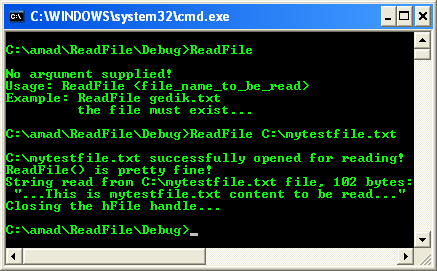The Windows File Management 23
Open a File for Reading Program Example
The following example uses CreateFile() to open an existing file for reading and ReadFile() to characters synchronously from the file. In this case, CreateFile() succeeds only if the specified file already exists in the current directory. A subsequent call to open this file with CreateFile() will succeed if the call uses the same access and sharing modes. You can use the file you created with the previous WriteFile() example to test this example.
Create a new empty Win32 console application project. Give a suitable project name and change the project location if needed.
Then, add the source file and give it a suitable name.
Next, add the following source code.
#include <windows.h>
#include <stdio.h>
#include <windows.h>
#include <stdio.h>
// A safer version for string manipulation
#include <strsafe.h>
// A prototype that receives a function name, displaying
// system error code and its respective message
void DisplayErrorBox(LPTSTR lpszFunction);
// Provide enough room for Unicode/multibyte lol
#define BUFFER_SIZE 200
int wmain(int argc, WCHAR *argv[])
{
HANDLE hFile;
DWORD dwBytesRead = 0;
WCHAR ReadBuffer[BUFFER_SIZE] = {0};
printf(\n);
// Verify the argument number
if(argc != 2)
{
// The file must be available
wprintf(LNo argument supplied!\n);
wprintf(LUsage: %s <file_name_to_be_read>\n, argv[0]);
wprintf(LExample: %s gedik.txt\n, argv[0]);
wprintf(L the file must exist...\n);
return 1;
}
hFile = CreateFile(argv[1], // file to open
GENERIC_READ, // open for reading
FILE_SHARE_READ, // share for reading
NULL, // default security
OPEN_EXISTING, // existing file only
FILE_ATTRIBUTE_NORMAL, // normal file
NULL); // no attr. template
if (hFile == INVALID_HANDLE_VALUE)
{
DisplayErrorBox(LCreateFile());
return 1;
}
else
wprintf(L%s successfully opened for reading!\n, argv[1]);
// Read one character less than the buffer size to save room for
// the terminating NULL character.
// Take note also for Unicode/multibyte size
if(ReadFile(hFile, ReadBuffer, (BUFFER_SIZE-1), &dwBytesRead, NULL)== FALSE)
{
DisplayErrorBox(LReadFile());
CloseHandle(hFile);
return 1;
}
else
wprintf(LReadFile() is pretty fine!\n);
if (dwBytesRead > 0)
{
// NULL character
ReadBuffer[dwBytesRead+1]='\0';
wprintf(LString read from %s file, %d bytes: \n, argv[1], dwBytesRead);
// Why we need to add 1???
wprintf(L%s\n, ReadBuffer+1);
}
else
{
wprintf(LNo data read from file %s\n, argv[1]);
}
if(CloseHandle(hFile) != 0)
wprintf(LClosing the hFile handle...\n);
else
DisplayErrorBox(LCloseHandle());
return 0;
}
void DisplayErrorBox(LPTSTR lpszFunction)
{
// Retrieve the system error message for the last-error code
LPVOID lpMsgBuf;
LPVOID lpDisplayBuf;
DWORD dw = GetLastError();
FormatMessage(
FORMAT_MESSAGE_ALLOCATE_BUFFER |
FORMAT_MESSAGE_FROM_SYSTEM |
FORMAT_MESSAGE_IGNORE_INSERTS,
NULL,
dw,
MAKELANGID(LANG_NEUTRAL, SUBLANG_DEFAULT),
(LPTSTR) &lpMsgBuf,
0, NULL);
// Display the error message and clean up
lpDisplayBuf = (LPVOID)LocalAlloc(LMEM_ZEROINIT, (lstrlen((LPCTSTR)lpMsgBuf)+lstrlen((LPCTSTR)lpszFunction)+40)*sizeof(WCHAR));
StringCchPrintf((LPTSTR)lpDisplayBuf, LocalSize(lpDisplayBuf) / sizeof(WCHAR), L%s failed with error %d: %s, lpszFunction, dw, lpMsgBuf);
MessageBox(NULL, (LPCTSTR)lpDisplayBuf, LError, MB_OK);
LocalFree(lpMsgBuf);
LocalFree(lpDisplayBuf);
}
To test this program, firstly we create a simple text file, mytestfile.txt with some content on C drive.

Then we run the program using the previously created text file name as the argument.

< Windows Files 22 | Win32 Programming | Win32 File Index | Windows Files 24 >